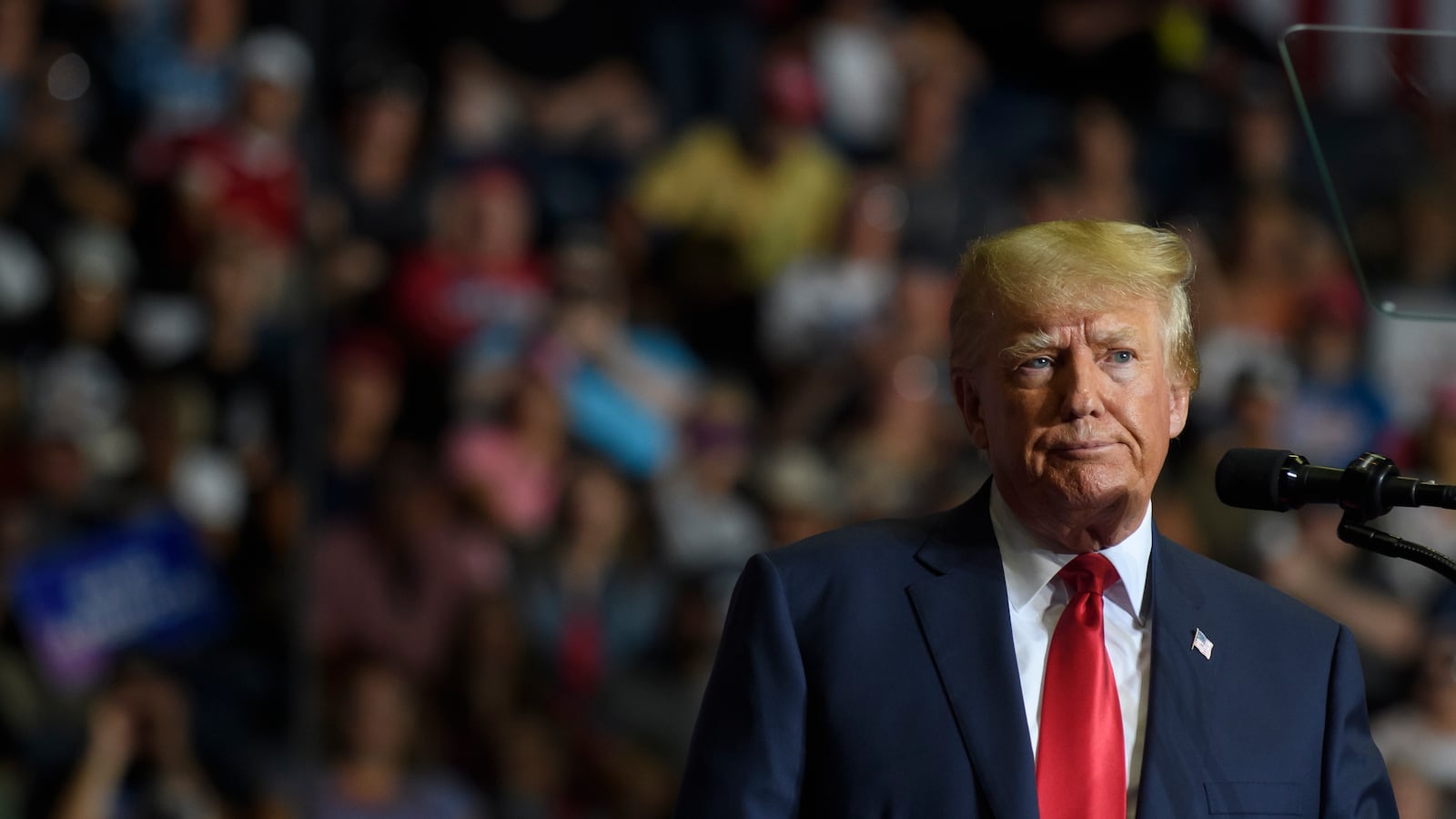For four long years, the United States was run by a “sophisticated parrot,” as campaign aides reportedly called him.
Rather than asking a high-ranking general to further elucidate a concept he didn’t quite grasp, Donald Trump, the nation’s commander-in-chief, instead “shouted down the teachers.” When preparing to debate sensitive issues such as transgender rights, he inquired as to whether the subject of one hypothetical scenario was “cocked or decocked.”
And while certain people believed Trump had a malign intent in many of his decisions, such as impulsively tweeting out a classified image in 2019 of an Iranian missile launch facility, others “believed he was operating with the emotional development of a 12-year-old,” playing fast-and-loose with state secrets “to get attention for himself.”
“If you take out the classification that’s the sexy part,” Trump allegedly responded to horrified advisers at the time.
That’s all according to Confidence Man: The Making of Donald Trump and the Breaking of America, an upcoming book by star New York Times reporter Maggie Haberman. Multiple news outlets have obtained excerpts of the book, among them The Daily Beast, CNN, and The Washington Post. Set to be released next Tuesday, the 607-page peek inside the Trump circus tent makes clear one thing: It was even dumber than we knew.
In response to concern over narcotics flowing into the U.S. from Mexico, Trump inquired during an Oval Office meeting about the possibility of simply bombing the drug labs, Haberman writes, according to the Post. Trump brought up the option after reportedly becoming “confused” by the military-style uniform Assistant Secretary for Health Brett Giroir was wearing (the U.S. Public Health Service’s Commissioned Corps is a uniformed service). White House aides didn’t bother explaining, according to Haberman, but simply prevailed upon Giroir to start wearing civilian clothes to the Oval office.
Growing disenchanted at one point with his daughter Ivanka and son-in-law Jared Kushner, family members who were hired in the face of serious ethics concerns, Trump ordered Chief of Staff John Kelly and White House counsel Don McGahn to fire them. But the pair refused, saying they thought Trump would leave them twisting in the wind when Javanka inevitably resisted. If he was really going to do it, then Trump needed to speak to the couple personally, Kelly said. Trump apparently said he would, then never did.
In a meeting with Theresa May, Haberman writes, Trump told the then-British Prime Minister, “Some people are pro-life, some people are pro-choice. Imagine if some animals with tattoos raped your daughter and she got pregnant?” He then gestured to Vice President Mike Pence, calling him a “tough one” on the subject, quickly steering the conversation to focus on his opposition to an offshore wind farm being built near a golf club he owns. And according to a book excerpt obtained by CNN, when Trump was first impeached in 2019, the former president said, “I’ll just sue Congress. They can’t do this to me.”
Few things matter more to the ex-president than his image, as he viewed his entire life like a TV show, Haberman writes. He described some people as having “the look,” such as his vice president, First Lady Melania Trump, and Supreme Court Justice Neil Gorsuch. They were right out of “central casting,” according to Haberman, while others, like former South Carolina Gov. Nikki Haley, Trump’s UN ambassador, were not. “Can’t we do better lighting or give her better makeup?” Trump reportedly asked after seeing one of Haley’s TV appearances.
When Trump met with outgoing President Barack Obama after winning the 2016 election, he had little interest in policy matters but instead asked the 44th president how he managed to keep his approval ratings up. Four years later, when the COVID-19 pandemic began killing massive numbers of Americans, Trump saw it as unfair to him, personally and politically, according to Haberman. “Can you believe this happened to me?” he said.
Trump laughed when White House aides grew angry over his idea to form a joint cybersecurity task force with the Kremlin, and often praised Russian President Vladimir Putin for his image as a strong leader. In one interview with Haberman, Trump insisted that he had given letters sent to him by North Korean leader Kim Jong Un over to the National Archives. He had taken “nothing of great urgency” with him after leaving office, Trump claimed. However, the letters from Kim were among the myriad sensitive and classified items the ex-president hoarded at Mar-a-Lago, leading to the present criminal investigation by the Department of Justice for mishandling official materials.
“Racial [sic] is more severe in New York than it is anywhere else that I can think of,” Trump told Haberman in one of the three interviews he granted her for the book. Trump’s perspective on race is “frozen in time,” hearkening back to the New York City of the 1980s. After linking up with biracial model Kara Young in the 1990s and meeting her parents, Trump told his new paramour that her looks came from her Black mother and her brains came from “the white side,” according to Haberman.
The book also reveals an episode in which Trump ordered a group of racially diverse Democratic staffers to fetch trays of hors d’oeuvres at a reception shortly after his inauguration, believing they were waitstaff, Rolling Stone reported.
In the book, Haberman recounts an episode involving a strange phone call Rep. Debbie Dingell (D-MI) said she received from an unknown number. A man on the other end said he was a Washington Post reporter and asked Dingell if she wanted an apology from Trump, who had insulted the congresswoman’s late husband at a rally. Dingell responded that she didn’t need an apology, but hoped that people could simply treat each other more kindly. “As the man talked,” Haberman writes, “Dingell couldn’t shake the idea that his voice sounded like that of the forty-fifth president.”
In a statement, Trump spokesman Taylor Budowich said, “While coastal elites obsess over boring books chock-full of anonymously-sourced mistruths, America is a nation in decline. President Trump is focused on saving America, and there’s nothing the fake news can do about it.”






